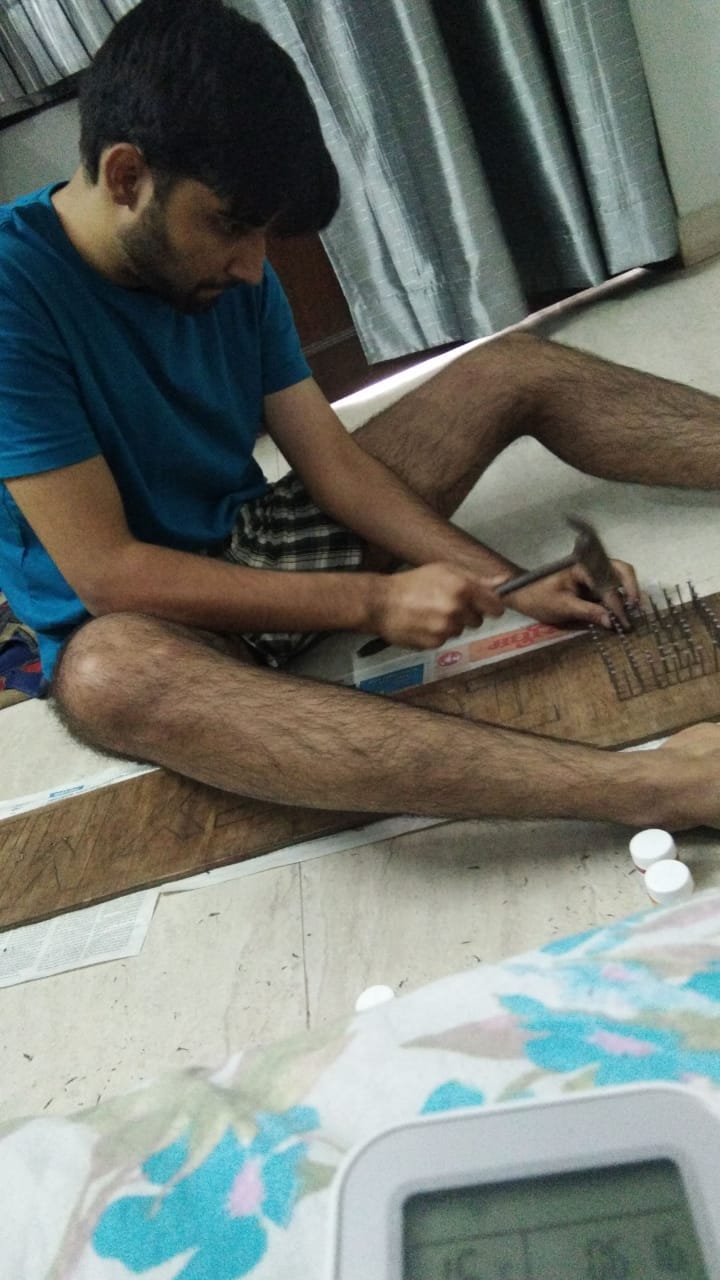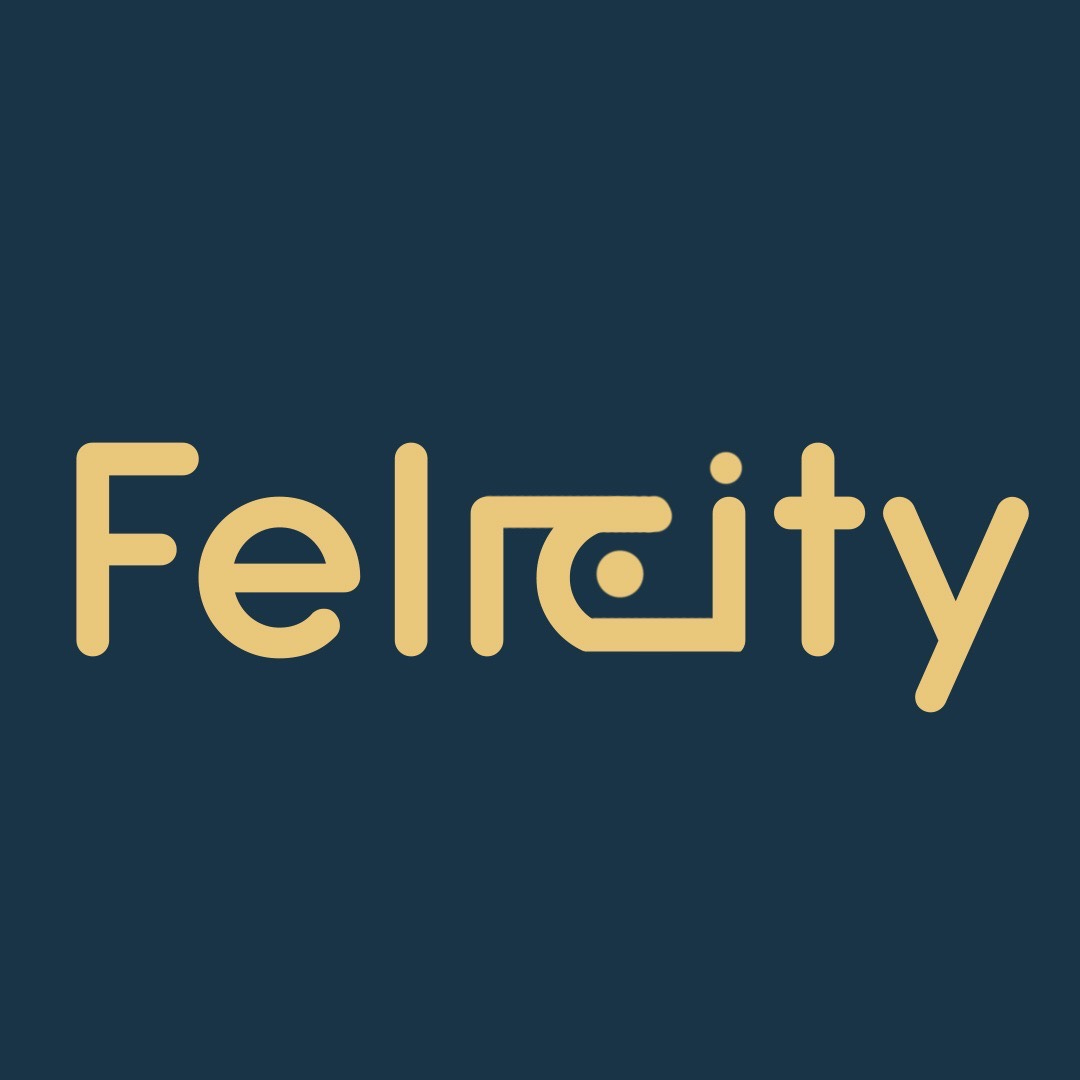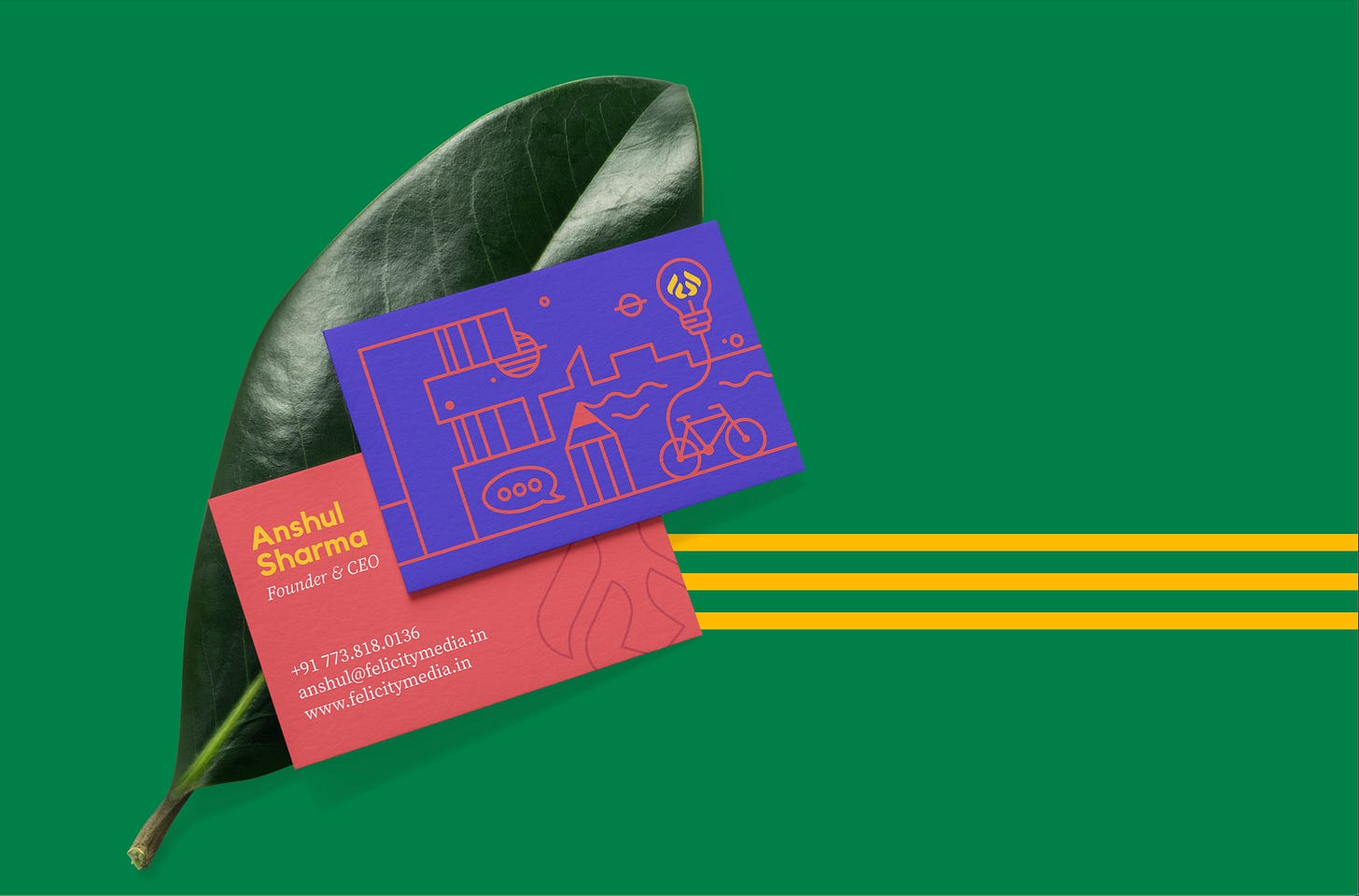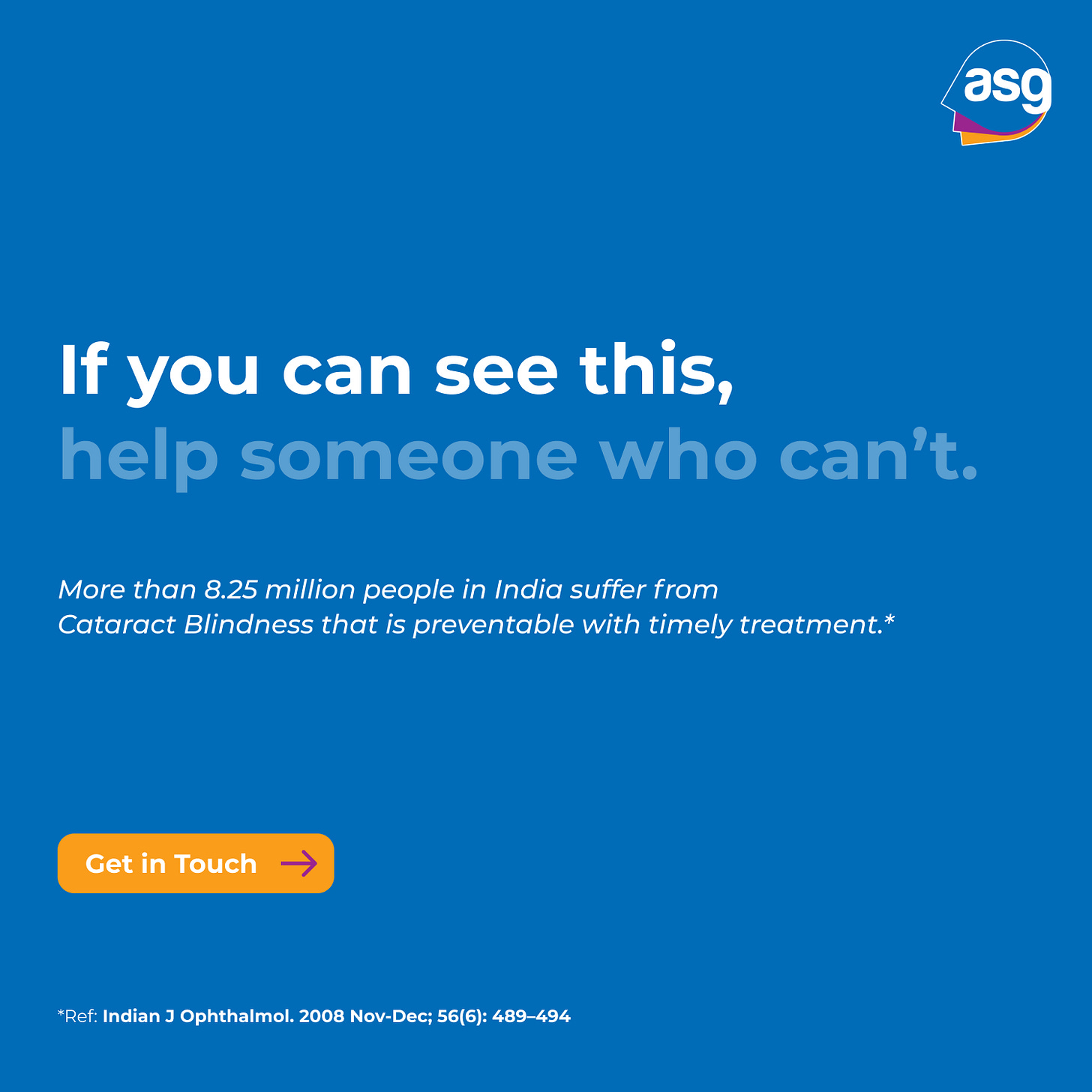The world doesn't need another agency
..and my journey of trying to build one

This issue of Adamant is different because it will not talk about marketing; for a good reason.
There are some things I want to share with fellow first-gen entrepreneurs as I finally close an important chapter of my life and move forward.
Today I want to talk about Felicity, the company I aspired to build to take the talent density India has to offer, to the world.
If there’s one thing I want you to reflect on while you read this, it is the ‘why’ behind your decision to build your first startup.
What motivated you to start?
Passion for your craft?
Financial freedom?
Autonomy?
…or probably something else.
All fair reasons.
In my case, it was simply an obsession with advertising, the freedom of getting to make my own creative decisions, and a dream to build the most prominent creative agency the world has ever seen. I wanted to change the way people perceive advertising.
The good part is, I still do. Just differently.
I’m sure; just like me, there must be people telling you that your dreams are too big and that what you’ve set out to achieve might always stay a dream.
These are the people you choose to eventually tune out and seek support around those that believe, sometimes even more than you, that at the end of the day, you’re doing what you genuinely want to, and it doesn’t matter how it goes; they’ll still believe in you the same way every. single. day.
I admire those who only come across naysayers and still choose to do what they set out to do. Luckily, I had many believers around me, without whom the journey would’ve been tenfolds difficult.
Note: This post is too long for email so open it on the website for an uninterrupted reading experience.
Connecting dots backwards, I realised that ads formed a big part of my life.
They made me buy all sorts of things - Beyblades, Boomer, Dairy Milk over Kit-Kat. They made me perceive things differently and persuaded me to choose one thing over the other. It intrigued me.
However, I never thought about how big of an influence they have on me till I started studying consumer behaviour, a bit of psychology, and marketing analytics.
I still remember phasing in and out of my study session with my best friend; she was teaching me Finance because I hateeeeed it, and in her good conscience, she couldn’t see me failing.
The exam was the next day, and while taking a 5 min break, I was lazily browsing LinkedIn and saw a case study video on Coke Zero. I legit cried watching the level of thought and execution put into the launch.
This “aha!” moment felt like an epiphany.
I was terrified when I moved to Mumbai from Jaipur, but I finally felt peace at that moment.
It felt like I had made it, and I hadn’t even started.
The name Felicity came up in a group activity during one of the marketing courses where we were crafting the go-to-market strategy for an imaginary brand.
We named a mental health startup Felicity since it means happiness.
But the name stuck with me as it held a sentimental value from the first project I ever did in marketing.
Later, when I founded my agency, I named it Felicity, only to realise that it also means the ability to express your thoughts.
It fitted perfectly with our promise to our partners - finding the right way to express their business to their customers.
In all seriousness, I had no idea what I was doing, but it was exciting to figure things out along the way, as I’ve always preferred doing things this way.
All that mattered was doing instead of participating in wishful thinking.
I registered Felicity on 12th June 2018. I was officially a business owner and a proud craftsman of Felicity’s first-ever artwork.
A business owner with no experience in team building, business development, legal and taxes. Just a kid in love with the idea of creating something extraordinary.
Nothing that I can’t figure out along the way.
But, I understood quickly that not knowing how a service business functions will not bode well in the nascent stages with zero credibility and positive signalling to the market. More on this later.
Logos I designed on Canva and Illustrator because I didn’t have the money to pay a designer.
I had to learn Adobe Illustrator to design a professional logo, so it is difficult for me to quantify what Felicity taught me, maybe to never stop finding another way when things get tough.
Pathetic designs, I know.
But, skills take time, and then you can do anything you want to. 👇🏼
Good enough to start and solidify my belief.
…and manifest my goals on my wallpaper.
…with endless support and encouragement from my friends and family.
All cute stuff when I reflect on how little I understood about running a business and going this meta on things that maybe don’t matter or add any “business value” to the company but now that I see it, it meant the world to me when I was starting.
In 2019, the final year of college, I started looking for work and connected with a website developer through LinkedIn.
In 2 weeks, I negotiated my first logo design and website development deal worth around Rs 1.15 lakhs with a client in Chennai.
When I closed the deal, I sat in disbelief at what had just happened: first enquiry call, first conversion.
I felt unstoppable, and the freelancer I was getting the website made would charge Felicity Rs 80,000, and I would design the logo myself.
Rs 35,000 would be our first profit since I wasn’t drawing any salary from it.
I delivered the logo within one week as promised, but the website part got dragged for over eight months because of an undefined SOW document and contractual agreements.
The client was delighted with the logo 👇🏼 and it was one of the sweetest things to see my work being out there in real life.
They were extremely unhappy with the website work, and I lost further business with them.
I was in the middle of managing freelancers’ and clients’ expectations, which took a toll on the quality of project delivery.
My first taste of success and failure was packed into one project.
This was my first client before I graduated, and finally decided to join a rapidly growing agency to learn how to build a world-class service business.
I joined Schbang in 2019 and quickly engrossed myself in the inner workings of an agency. I joined as a solutions strategist because I knew the position would expose me to all business verticals and aid my understanding of how processes function in a high-growth service business.
I was looking for a steep learning curve so that I could get back to Felicity. I started the job with the intention to leave in a year—one of my biggest mistakes.
I had followed Schbang since its early days in 2016, when it had about 70-80 employees and a few blue chip accounts with a powerful vision of taking India to the world and becoming India’s first independent agency to go global.
I wanted to do the same, so I joined them in 2019.
Schbang is the perfect place to start and stay for anyone wanting to enter the advertising world.
The vision set by Harshil, Akshay, and Sohil to take India to the World in itself is bold, and I haven’t met better operators than these three.
The teams they created, the company culture they built from day one, and the unabashed passion with which they push the envelope is the reason why Schbang has scaled from 40 people in 2015 to over 1000 solid creative professionals in 7 years, delivering on their vision by going global and serving the most prominent brands operating in the world with rigour and finesse.
Schbang was my sandbox, and I cherish every moment I spent there and got to work closely with the most wonderful and talented bunch of people.
I made two mistakes, one I regret and one that I don’t.
Quitting early [I don’t regret this]
I worked at Schbang for 1.5 years, half of which was during the first wave of the pandemic. Now, here’s the thing, I joined with a mental timeline of 1 year, which is not an excellent way to start working at a place you have no internal context about. Before I knew it, I fell in love with the company, its people, and the work I was getting to do.
But, the timeline kept nagging at me, and I started to convince myself that I needed to move on to Felicity. This is where we make a mistake; when we feel we need to move on, we make up things that might not exist in the first place.
Now when I look back, Schbang was offering me everything I was dreaming of building with Felicity. It had the same vision, I was offered a good growth path, and I loved the work and the team I was getting to do it with.
The only thing missing was ownership and having skin in the game, which I realise is difficult to have as a fresher unless you start something on your own; another reason I founded Felicity. I wanted a steeper learning curve.
This is why I don’t regret my decision, even though I sometimes feel sad about leaving a company I thoroughly enjoyed working with.
There’s nothing but love and respect for Schbang and especially my team and the leadership of Harshil and Akshay for supporting and guiding me even after I left and started on my own.
They even offered to invest in Felicity, bring it under The Schbang Network, and help me with the processes and client introductions.
I will forever be grateful to them for trusting me and fostering a culture of collaboration in a world where others play a zero-sum game.
They challenge the status quo and change our Industry for the better every day.Idolised Schbang’s Journey [I deeply regret this]
I was 21 when I started working at Schbang and began reading about Harshil and his journey building FoxyMoron and then moving to Schbang.
Before I knew it, Schbang became my FoxyMoron, and Felicity became my Schbang. I started to dream about building an agency with the same vision and goals without realising I’m not Harshil, as Harshil isn’t me. All journeys are different. I didn’t see it then. I idolised him and his life, as I wanted to be like him.
Felicity at Day 0 could never match Schbang at Day 1000. I know, pretty obvious, but my survivorship bias didn’t let me see this.
This is where I missed the plot; every milestone was compared to Schbang, which became a recipe for disaster. I tried to replicate each and everything Schbang did, and I never got to building Felicity’s identity, which hurt our progress.
I unintentionally made Harshil my idol when I truly intended to learn from him and saw him as my most valued mentor.
If there’s one thing I’d like you to take from this, look for mentors, not idols. You will lose your identity matching up to your idols.
After 1.5 years at Schbang doing the work I was proud of, I finally made the jump in October 2020 to start building Felicity from scratch.
New branding, new SOPs, an all-new feeling. I went meta into building an agency.
There’s a lot of good work we did we’re proud of.
A series of Moodfilms we produced for our traditional apparel client; Ethnic India
..a lot of eye-candy and impactful creatives
..and many websites like KCL Food, Ethnic India, Networking Now India, and FitFace
There are many things worthy of a display here, but that isn’t my intention with this issue, so I’ll share my learnings and why I am moving on.
If there are three things you should ask yourself when deciding to startup, ask these:
What is the specific problem I am going to solve?
This may seem a generic question, but more often than not, the answer isn’t clear. Before you know it, you start experiencing a loss in morale which is definitely not a good start. I made this mistake. I convinced myself that I was building an Ad Agency and never really thought about what kind of agency I wanted to really build. I got lucky I cracked a few projects early on. Leaving an important step on luck is bad business acumen.Who am I going to build this with?
This is probably the most important thing to know. Who will be the cofounders? Entrepreneurship looks glamorous from far away. It isn’t. And when push comes to shove, you will need people you can trust to ride the high tides with you. Solopreneurship isn’t for everyone, at least, it isn’t for me. Assemble a founding team that complements each other and is equally passionate about what you’re building.Do I understand the stakes and what it takes?
I didn’t completely understand what I was getting into. I left for a steeper learning curve, creative ownership, having skin in the game and simply wanting to build the biggest creative powerhouse the world has ever seen - without really understanding what success means to me, how I’ll measure it, and what it takes to do it in the first place. I was naive enough to overlook that creativity isn’t the only thing I’ll require when I finally become a business owner. It will also entail managing cashflows, building teams, protecting the company from legal liabilities, and many other tasks that I can’t afford to neglect as a founder.
It’s a human tendency to look at rosy things and assume the best-case scenario where we have 1000 people working on things we care about in an amazing office with the best possible clients. It doesn’t appear out of thin air and isn’t the right intention to start with.
I was full of energy till I realised all the additional work that comes with being a founder. I was never interested in finance, legal, or HR, but I had no choice but to focus on these functions as they were integral to our operations. It really started to put me off and drain my energy to do new things.
You can definitely hire people to manage these departments, but you will still be involved in these more than you care to do.
So, like it or not, you will wear all hats, so be prepared. I struggled with this unless I came to terms with it.
Know what you don’t want to do and bring key people in to handle these areas so you can focus more on things you care about and contribute there.
Consider the second-order effects of your decisions before you make that jump.
I was not the most structured person when I started Felicity, here are some things I learned in this area.
A business plan isn’t just a piece of paper
Since I had no clear idea about what I was doing, I never got to create a business plan. I only realised this in a discovery meeting with Harshil, who helped me create one. You don’t have to follow the plan exactly how it’s laid out, but there is nothing more valuable than having a written plan that guides you on your journey and helps you course-correct when required. Ignore this at your own peril.Documentation and clear writing is the holy grail of business
I was asked to keep notes during meetings at my first job. I never understood the true value of this activity until I messed up key details after a week and had no record of it. Writing helps you think clearly and chart details you will otherwise miss out on. Writing clearly and documenting processes, ideas, and anything else that’s important is the highest leverage you can create for your team, both as a member or a leader.Founder’s behaviours and habits trickle down to the entire organisation
This became evident when we started growing from a team of 2 to a team of 7 people. In the 8 months we worked together, we had 1 town hall. All because I thought working in isolation reaps better results at that time. It was how I operated back then, but not anymore. There is no better way to produce great results and foster relationships than ensuring that there are regular meetups and townhall that allows everyone to be on the same page. Since I signalled to the team that it is okay to work all the time independently, they mirrored my behaviour, and during exit interviews, this was the most eye-opening feedback I got which should’ve been obvious in the first place. As a founder, it is your duty to walk the talk. I missed this. You don’t have to.
Call it tough love, but I had to get off my high horse and start accepting things that were holding me back. This issue of Adamant is as raw as it can get and will always be a reminder to not make the same mistakes again.
Learn to manage yourself before you set out to manage others.
As I end this incredible chapter of my life, here are some other learnings that I’ll keep adding to as and when I realise them moving forward.
There’s value in being new to the industry. You don’t know the rules, so you can make them. Be foolish but know where you are headed.
Selling should start on day 0. There is nothing more important than positive cash flow. You can’t eat dreams. Start selling and don’t self-reject. The worst that can happen is to hear a blatant ‘No!’. Learn from it and move on.
Trust is the ultimate currency you earn with every interaction. Difficult to earn and very easy to break. Don’t break anyone’s trust.
No one cares, but if you ask people, they will help you. But you have to ask.
Fake it till you make it is a recipe for disaster if your plan isn’t clear. We overestimate our ambitions, which makes us look like a fool. Honesty and transparency are the keys to trusted partnerships.
Signalling is a huge part of what you’re doing - culture, product, service. Whatever it is that you’re building - talk about it. No one will dig for something they don’t know about.
There is definitely value in doing free work or at the cost in the beginning when you’re building a proof of work. Consider it your credibility budget.
Perfectionism is an excuse to not get things done. Most of the time, it is your fear of failure surfacing and paralysing you to take action. TAKE ACTION!
Your company’s culture is the sum of all interactions within and outside your company. Be mindful of it.
Don’t just read about Pareto Principle, imbibe it. Focus your effort on 20% of those things with an 80% impact. 20% usually consists of your team’s wellbeing and customer satisfaction. Don’t micromanage yourself into doing things that don’t matter.
Don’t play with people’s time. It’s better to show up when you promise to. Keep your promises.
Working at the cost of your mental health is the worst trade-off. Know your boundaries and when it’s enough. Take care of yourself before you take care of your business.
You will feel that you’re being left behind. It is okay to feel this when your imposter speaks to you, but if it happens more frequently than you’d like it to - trust that feeling. It’s a good indication that your heart isn’t at the right place and it’s time to move forward.
People around you will not necessarily understand what you’re going through - be it your friends and family. It’s not their fault as it is difficult to put ourselves in others’ shoes. Remember that they care about you and only want the best for you.
It is a lonely journey, but I’m not sure I’m convinced if this is the only way.
Don’t confuse passion for your life’s work. Chasing your passion may not be the wisest decision as it’ll blur your rationality and amplify your survivorship bias. Be wary of this.
I’m a big believer in second chances. If we’re not making enough mistakes, we are not really learning anything new. What I take from this experience is truly priceless.
I never really gave myself any credit for my work in the last few years, but while writing this, I can see how much Felicity has helped me grow, both personally and professionally.
I am eternally grateful to everyone that helped me through this journey. If you’re reading this, you know who you are. You kept me going.
I do want to mention someone without whom Felicity would amount to nothing. She joined as an intern and quickly wore many hats. She challenged me every step of the way to be, and do better. Stuti Shetty, if you’re reading this - I have no doubt you’ll go places. I learned from you every single day and will continue to do so. Thanks for nurturing Felicity as if it was your own; because it truly was.
To the world, I say this - I still believe as strongly in my vision to take India to the world. There has never been a better time to show the world what we are capable of and I will make my mark. I will change the world, in my own little way.
To Felicity, thanks for being my hope that I hold the power to do incredible things.
Until next time.
P.S.: I’m back at Schbang with an open view of what I can build within the company itself, and I couldn’t be happier! The entrepreneurial spirit is being put to good use as we structure ourselves to achieve our set vision of India to the world!























Reading this takes me back to my agency days just a small 18 yo figuring out how to survive in this world and sell marketing. It a fundamental read for anyone who is a first time market or entering into marketing
Every exit is an entry somewhere else! Great story :)